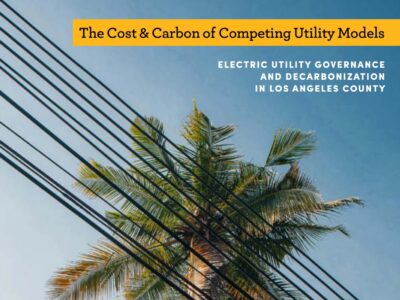For U.S. Climate Policy, It’s Oct. 2016 All Over Again
We knew Trump would wreck U.S. climate policy. He told us so.
Four years ago this week, I wrote about environmental stakes in the presidential election. The environmental stakes are equally high this time.
If anything, Trump’s rollbacks of environmental regulations have been more thorough and severe than anticipated. He has also worked hard to open up federal lands and waters to more drilling and mining. One estimate that his policies will result in an additional 1.8 billion tons of carbon in the atmosphere by 2035.
I can’t say that I’m generally much of a prophet, but I got this one 100% right. And I was also right with the reminder that elections have consequences. Vote however you like, but don’t pretend it doesn’t matter.
Here’s what I wrote in 2016:
Forty percent of millennials don’t see a difference between Clinton and Trump on environment, energy, or climate policy. That’s just wrong — so wrong that it’s hard to believe anyone is that misinformed. The candidates are as different as day and night on those issues. As Paul Krugman said on Friday, “there is a huge, incredibly consequential divide on climate policy.”
Trump’s enthusiasm for fossil fuels, and his opposition to climate policy, aren’t just a matter of a few stray tweets. It’s memorable that he has called climate change a hoax. In August, he said that no one “knows for sure” whether the planet is getting warmer or cooler. But it may be more significant that his environment and energy transition team is headed by Myron Ebell, a man who has devoted his entire career to denying the existence of climate change. . . . . Trump has called for drastic expansion of U.S. production of oil, gas, and coal. It’s not surprising that Trump has pledged to eliminate Obama’s carbon restrictions and back out of the Paris Agreement. If you want more carbon in the atmosphere, Trump is definitely your guy.
Clinton has been just as clear about her belief in the seriousness of climate change. In her acceptance speech, she made her position totally clear:
“I believe in science. I believe that climate change is real and that we can save our planet while creating millions of good-paying clean energy jobs.”
She has strongly endorsed Obama’s Clean Power Plan and the Paris Agreement. As Secretary of State, she helped lay the groundwork for Paris in discussions with Chinese and Indian leaders. As a Senator, she is said to have been a “very focused, very diligent” member of the environment committee. She had a lifetime score of 82% from the League of Conservation Voters. (Trump hasn’t held an office so he doesn’t have a score; Pence’s lifetime score was 4%) Her transition leaders include Ken Salazar, formerly Secretary of Interior, and Jennifer Granholm, who has made renewable energy a personal crusade.
How you vote, or whether you vote, is your decision. But don’t make the mistake of thinking their policies are the same. One wants to increase the use of fossil fuels; the other wants to fight climate change. Elections have consequences.
If Hillary Clinton had won and a few Senate races had gone the other way, there would be a liberal majority on the Supreme Court instead of a semi-permanent conservative majority. The U.S. would be leading negotiations to strengthen the Paris Agreement instead of leaving it. Obama’s regulations would be implemented instead of rolled back. And there would be many tons less carbon in the atmosphere.
Reader Comments
One Reply to “For U.S. Climate Policy, It’s Oct. 2016 All Over Again”
Comments are closed.






Actually Prof. Farber, you continue to be in a state of denial because you refuse to admit that your male dominated academic establishment has totally failed to communicate with the public to inform, educate and motivate us to fight climate change, because of your Hofstadter culture that considers the public to be too impure for academics to communicate with. Of course this also goes along with your dominant male academic cultural attacks against female academics as documented in the new Fall issue of California Magazine, in a cover story “Swift Justice When Berkeley Law denied tenure to Swift, she fought back.”
Thus the worst case scenario that academic males have produced is that you have failed to heed the lessons of history and meet the challenges of change that have destroyed previous civilizations, as documented by the Durants in their epic series “The Story of Civilization.”
Stop pointing fingers at others while failing to meet the challenges of change yourself, because you have enabled Obama’s regulations to be rolled back. Time may have already run out because of your cultural failures.